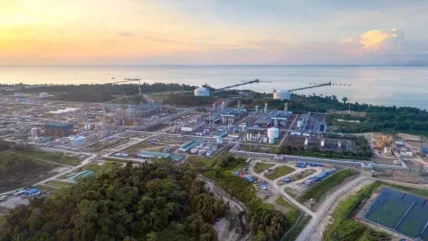
Saipem and its consortium partner Meindo Elang Indah have won a $1.2bn offshore contract for the Tangguh UCC Project, located in Indonesia’s Papua Barat Province.
The engineering, procurement, construction, and installation (EPCI) contract, awarded by BP Berau, forms a critical part of the broader Tangguh UCC initiative. This project focuses on developing the offshore Ubadari gas field, implementing carbon capture, utilisation, and storage (CCUS), and enhancing onshore compression facilities.
Saipem’s share of the contract amounts to approximately $1bn.
In a statement, Saipem said: “The award of this important contract in Indonesia consolidates Saipem’s position in the segments of natural gas and of CO2 capture and storage projects, thanks to a unique combination of world-class assets with engineering and technological know-how.”
The Tangguh UCC Project aims to extract natural gas from the Ubadari offshore field and transport it to the onshore liquefied natural gas (LNG) facility for processing. At the facility, carbon dioxide (CO2) will be separated from the gas and re-injected into the reservoir via an offshore platform to enhance natural gas recovery.
Saipem’s responsibilities under the contract include the engineering, procurement, construction, and installation of two wellhead production platforms, a CO2 reinjection wellhead platform, and around 90km of associated pipelines. The infrastructure will be fabricated at Saipem’s Karimun yard in Indonesia, which spans 1.4 million square metres and employs over 5,000 workers.
BP and its partners had recently made a final investment decision on the $7bn Tangguh UCC Project. This investment is expected to unlock approximately three trillion cubic feet of additional natural gas reserves to meet Asia’s growing energy demand.
Production from the Ubadari field is scheduled to commence in 2028.
Additionally, the project will establish Indonesia’s first large-scale CCUS facility, with the capacity to sequester up to 15 million tonnes of CO2 in its initial phase. The initiative builds on the expansion of the Tangguh LNG facility, which began operating its third LNG train in 2023, boosting the plant’s total liquefaction capacity to 11.4 million tonnes annually.






